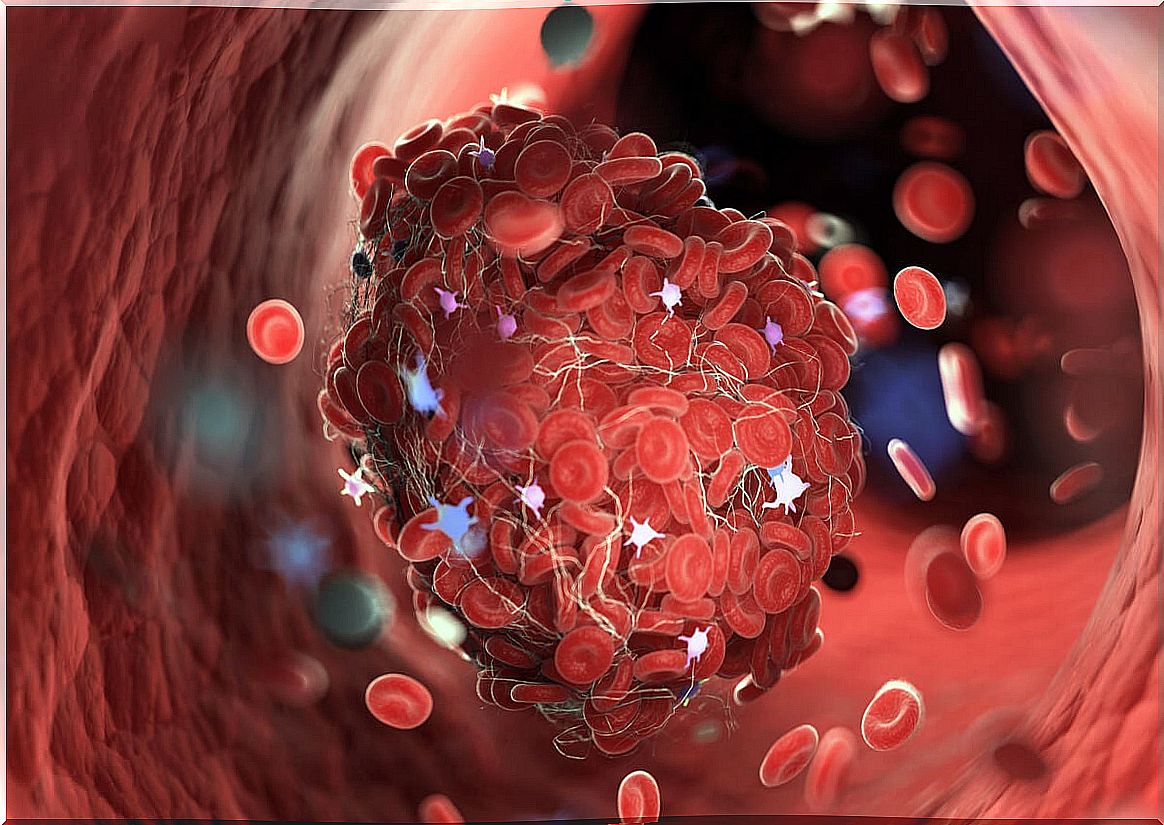What Causes Chronic Inflammation And How Can It Be Controlled?
Chronic inflammation is one of those silent enemies of health. Many times it runs without the affected person noticing it, until it is too late.

Inflammation as such is a response of the body to an internal or external aggression. It can be from a wound, an infection, or a toxic substance. There is talk of chronic inflammation when it persists for days, weeks or months.
The condition can go unnoticed. Unlike an acute or temporary form, the chronic one often has no obvious symptoms. This leads to it being detected too late in some cases.
Two factors come into play in this condition: the nature of the element causing the irritation and the body’s response to it. Chronic inflammation can damage cells, tissues, and organs. This, in turn, causes DNA damage, tissue death, and internal scarring.
What is chronic inflammation?
When there is an element that causes an attack on the body, the immune system is activated and causes inflammation. The objective is to slow down the advance of the damage. Then comes a stage in which the tissue that was attacked is restored and the residues of the process are eliminated.
However, there are times when inflammation persists over time. It is as if the organism continues in a constant state of alert. It ceases to serve the restorative purpose and becomes harmful. This is called chronic inflammation and it is a factor that pays the way for various diseases to appear.
Chronic inflammation is sometimes also called low-grade inflammation (IBG). Other types of processes operate in it and can have devastating consequences. In general, it promotes degenerative pathologies, accelerates aging and shortens life expectancy.
What are your symptoms?

As already noted, chronic inflammation causes less noticeable symptoms than acute inflammation. These are subtle, misleading and fuzzy, so they cannot always be detected in time.
A problematic aspect is that it affects several tissues at the same time. There are complex alterations of cellular metabolism and the signs are several of the following:
- Continuous fatigue
- Anxiety, depression, and mood disorders.
- Insomnia.
- Gastrointestinal difficulties: diarrhea, constipation, gastric reflux, mouth ulcers.
- Weight gain.
- Frequent infections and fever.
- Pain in the abdomen, chest, or other parts of the body.
These symptoms range from mild to severe and can last for several months or even years.
Main causes of chronic inflammation
Chronic inflammation can appear as a result of any of the following circumstances:
- Persistent viral or microbial infections.
- Prolonged exposure to toxic agents.
- Autoimmune diseases.
On the other hand, the pro-inflammatory factors or that facilitate processes of this type are the following:
- Sedentary lifestyle.
- Obesity: body fat, especially that of the abdomen, generates inflammatory cytokines. These affect the entire body and do not cause precise symptoms.
- Diabetes: chronic inflammation favors diabetes and this, in turn, facilitates chronic inflammation.
- Hypercaloric diet: eating excess calories and saturated fat, as well as refined carbohydrates, increases the risk of chronic inflammation.
- Smoking and alcoholism.
- Physical and psychological stress.
- Age: the older the age, the greater the risk of developing chronic inflammation.
- Some medications
Possible Complications of Chronic Inflammation and Effects on the Body
There are several serious diseases associated with chronic inflammation, such as cancer, heart disease, rheumatoid arthritis, asthma, and neurodegenerative conditions, such as Alzheimer’s.
Balance problems
This type of inflammation leads to the development of chronic inflammatory diseases. In these, the body overreacts and attacks the body itself.
Sometimes the attack is on the coverings of nerves (myelin), making it difficult for nerve signals to pass. Consequently, there is dizziness or imbalance, especially when walking.
Insulin resistance
Chronic inflammation can reduce the effectiveness of insulin. This leads to high blood sugar levels and consequently damage to blood vessels and nerves. Also, diabetes may develop.
Muscular weakness
The muscles become inflamed and this leads to a breakdown of the muscle fiber. Usually it is a slow process that affects especially the torso, hips and shoulders.
Muscle weakness may prevent you from performing simple everyday tasks, such as bathing, swallowing, or walking.
Inflammatory bowel disease
Includes ulcerative colitis and Crohn’s disease. Both are due to an exaggerated response of the immune system and the result is an inflammation of the colon and small intestine.
The symptomatic consequence is frequent diarrhea and sometimes nausea, skin rashes, fever, and joint pain.
Ankylosing spondylitis
This is a chronic form of arthritis that mainly affects the bones at the base of the spine. Sometimes it also acts on the neck, chest, hips or knees. There is pain and stiffness, and in the most severe cases there is difficulty moving.
Chronic fatigue
This is one of the typical signs of chronic inflammation. It is present in diseases such as fibromyalgia, multiple sclerosis, lupus, and rheumatoid arthritis.
Livedo reticularis
This is a vascular condition that causes the skin to appear purple and mottled. The appearance is similar to that of a lace. The most common is that it appears on the arms and legs and that it worsens when it is cold. Sometimes nodules or sores also occur.
Arteriosclerosis
Chronic inflammation favors hardening of the arteries. This is due to the accumulation of fatty plaques on the vascular walls. This condition is a risk factor for heart attack and stroke.
Blood clotting
Some diseases derived from chronic inflammation can cause hypercoagulation, that is, the blood clots excessively or does so with minimal stimuli. This increases the risk of pulmonary embolism, heart attack, and stroke.

Dry eye and Sjögren’s syndrome
Dry eye is a very common effect of chronic inflammation. Likewise, Sjögren’s syndrome can appear, causing dry eyes, nose and throat and inflammation of the salivary glands. In severe cases there is loss of vision and dental alterations.
Brain problems
There is evidence that chronic inflammation favors the development of Alzheimer’s disease and other dementias. This especially affects older people. Likewise, there may be memory problems and difficulty thinking.
Prevention of chronic inflammation
A healthy lifestyle is the best way to prevent chronic inflammation. This problem is closely related to food, so special emphasis should be placed on this aspect.
The most advisable measures are the following:
- Avoid some foods: specifically margarines, butter, sunflower, corn and refined oil, added sugar, white bread, industrial pastries and soft drinks.
- Reduce calories: involves a low calorie diet and a balance between energy consumption and expenditure.
- Choose fats: There must be a relationship between omega 3 polyunsaturated fats and saturated fats with anti-inflammatory acids, such as the lauric acid in coconut oil.
- Take care of the intestinal flora: it is achieved with the consumption of fermented foods rich in soluble and insoluble fibers.
- Take supplements: There are many, but quercetin, boswellia , turmeric, fish oil, and magnesium stand out.
- Practice intermittent fasting: It has been shown to be effective in reducing chronic inflammation.
- Get regular physical activity.
- Maintain sufficient sleep patterns.
- Manage stress.
The risk of chronic inflammation
As chronic inflammation is a risk condition for developing several serious diseases, such as cancer, it is best to prevent it with a healthy lifestyle. In particular, you have to take care of your diet.
The diagnosis of chronic inflammation is made on the basis of blood tests. In the event that a person suspects that they may suffer from this problem, the most logical thing would be to notify the doctor so that he can evaluate the situation.









